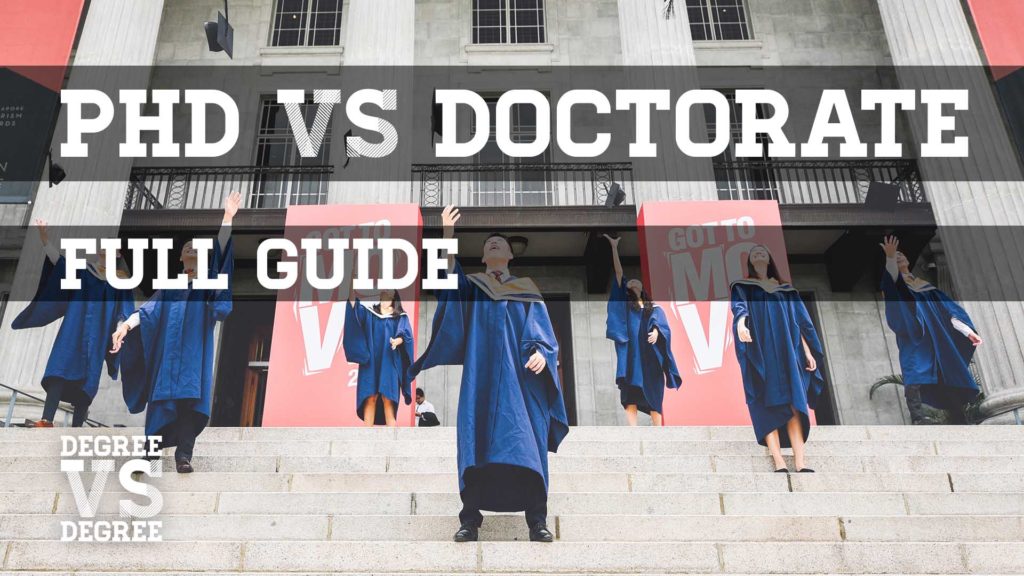Many people across the world use the terms PhD and doctorate interchangeably, but that is far from the truth. Both these educational degrees differ in terms of course content and future prospects, which make it important for you to choose the right one for your needs. For example, many believe that if you were interested in a career in teaching, a PhD would be more beneficial, while a doctorate may be ideal for people working towards the next step of their professional career. The differences between both of these – when you are thinking about a doctorate degree vs PhD – is a little more complex than that.
In order to give you a better understanding about what are the major differences between the two career trajectories and your future prospects if you choose to go either way, we have compiled this brief primer about a doctoral degree vs PhD.
PhD
First, let’s look at a PhD or a Doctor of Philosophy degree, which is a more research-oriented doctorate. The use of the term “philosophy” is critical here, as it refers to the research and pursuit of knowledge that is involved in attaining this level of education. Keep in mind that you will not be studying the subject of philosophy – unless that is what your PhD is in. Traditionally, it may take longer to complete a PhD and the dissertation involved would be more research oriented than the requirements for a doctorate. Here are some of the main features of a PhD that differentiate it from an application-based doctorate.
Average Time It Takes to Complete
There is no set time for the completion of a PhD but the time frame usually runs between five years and eight years. Most PhDs require for you to complete the full 120 semester credit hours and present a dissertation in order for the degree to be completed. You will also be required to defend your thesis or dissertation in front of a panel. On average, most people take about eight years to finish a PhD.
Requirements to Enroll
There are no set rules about the conditions that you have to meet in order to qualify for a PhD program – these vary from college to college (university to university). Some common requirements are a master’s degree, a high GPA, good scores on tests like the GRE and letters of recommendation. You may also be required to turn in an essay or personal statement in addition to these documents.
Average Cost
The average cost of a PhD can run over $30,000. However, this should not keep you from applying, as most colleges and universities waive the tuition fee of their PhD candidates and also offer stipends for assistantship and research work. Most people who get their PhD are able to come out completely debt free, unlike most other graduate programs, which can leave you under huge amounts of debt – all of which will have to be paid off in the years that follow.
Average Salaries
There is no exact average salary for people who finish their PhD, as it is a very subjective matter. If you pursue a PhD in a field like hard sciences, you might make more money than a person who has a PhD in a language-related field or the social sciences. The average figure goes upwards of $100,000, depending on the field that you specialize in.
Doctorate
 A professional doctorate is different from a PhD in terms of the focus of study and course set up. Popularly known as an applied doctorate, this degree will focus more on the application of the subject that you are studying. This means that the real world implications and applications are the primary areas of focus under these programs and they are geared towards career advancement more than research. You may be required to complete a dissertation but there are a number of programs that do not have this requirement.
A professional doctorate is different from a PhD in terms of the focus of study and course set up. Popularly known as an applied doctorate, this degree will focus more on the application of the subject that you are studying. This means that the real world implications and applications are the primary areas of focus under these programs and they are geared towards career advancement more than research. You may be required to complete a dissertation but there are a number of programs that do not have this requirement.
Average Time It Takes to Complete
On average, a professional doctoral degree takes lesser time to complete than a PhD in any subject. The degree requirements in terms of hours vary between 60 to 120 hours, depending on the field of study. Most doctorates can be completed between four to six years, but the final duration will vary from program to program and the institution that is offering it.
Requirements to Enroll
There are no set requirements for enrollment but – as in the case of the PhD – you may be required to finish a master’s degree before applying for a doctorate. In addition to this, you may need a number of academic qualifications and professional recommendations in order to be eligible for the program.
Average Cost
The average cost associated with the completion of a professional doctorate or doctoral degree is higher than a research-based PhD. While a PhD program will have a tuition fee over $30,000 – as discussed before – professional doctorates can cost close to $50,000 on average. This is a significant jump, which needs to be kept in mind when you are applying. The program may waive some of this, but the level of funding does not match that of a PhD.
Average Salaries
Once you have completed a professional doctorate, your average salary will see a big spike – especially in areas like the sciences and medicine – but you must keep in mind that a large chunk of this may go back in getting rid of all the debt that you accumulated over the years of education.
Wrap-Up
No type of consensus can solve the doctorate vs PhD debate, as the decision differs from person to person, depending on the career trajectory that you choose and the time and money you want to invest in the move. The differences highlighted in this piece may help you realize what is the better option for you personally, but none of the degrees are better than the other.
Both require a great level of dedication, research and hard work. Once you have completed either of these degrees, you will qualify as an expert in your field and can command a higher salary than you would be eligible to before completing it!

